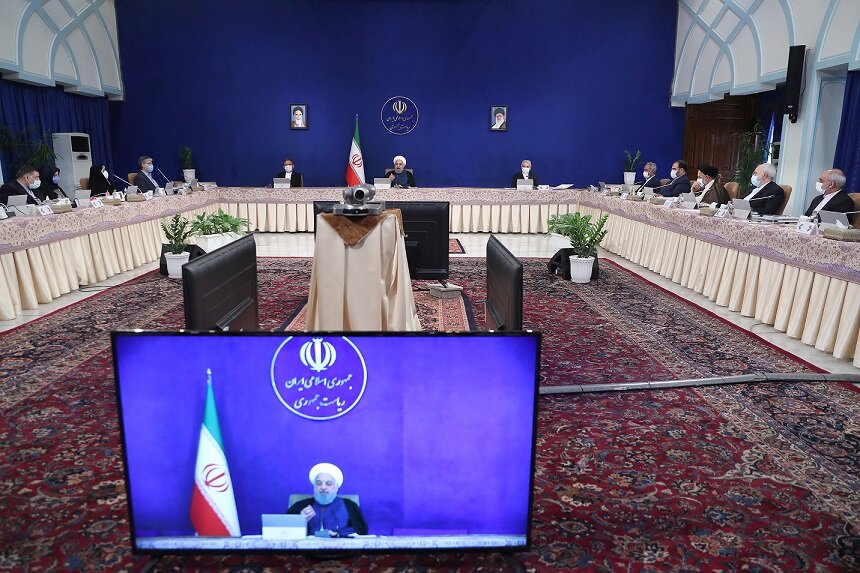Insulting Prophet Mohammad is an insult to all Muslims: Rouhani

TEHRAN – President Hassan Rouhani on Wednesday denounced the republication of a cartoon in a French satirical newspaper featuring the Prophet Mohammad (PBUH), saying that insulting the Prophet is an insult to all Muslims.
“The Westerners should know that the great prophet of Islam is loved by all Muslims and freedom-seekers of the world. Insulting the Prophet is a violation of ethics and an insult to all Muslims, Prophets of God, and human values,” Rouhani was quoted by the official website of the president as saying.
Speaking at a cabinet session, the President added, “If the West, Europe, and France are right that they are after creating peace, brotherhood, tranquility, and security in today's society, they should stop interfering in the internal affairs of Muslims. Because all problems and resentment that have been created in the hearts are due to the oppression, harassment, and inappropriate interference of the West in the affairs of Muslims throughout history.”
Underlining that the Prophet was also the teacher of humanity and mercy for all the world, Rouhani pointed out that disrespecting a prophet encourages violence.
“Surprisingly, those who claim to have culture and democracy encourage others to commit violence and bloodshed, though unwittingly,” the president noted.
According to Rouhani, the Prophet Mohammad preached about the need to show respect for others, ethics, and freedom.
“Offending, insulting, stating improper things, and drawing ugly cartoons are not part of ethics, democracy, and humanity,” Rouhani said in an apparent response to the cartoon recently republished by the French satirical newspaper Charlie Hebdo that sent shock waves throughout the Muslim world.
Muslims around the world, including political and religious leaders, condemned in the strongest terms the insulting cartoon, with some leaders even calling on Muslims to boycott French products in response to French President Emanuel Macron’s insistence on displaying the blasphemous cartoons in public places.
Rouhani praised the Muslim world’s “decisive” response to the Western officials’ remarks, saying that “this very timely and decisive reaction showed that the Muslim world will continue to be guided by its great leader the prophet of Islam.”
He also called on those who took the wrong path of insulting the Prophet Mohammad to change tack and return to the path of justice and show respect for all divine religions.
Rouhani sought to draw a fine line between freedom and ethics, saying that freedom does not allow people to commit immoral acts.
“Where does freedom say that freedom means closing the moral lesson? Freedom can be beneficial to society when it is accompanied by respect for all values. We cannot abandon ethics and values,” the president asserted.
Muslim leaders have strongly criticized President Macron after he said that France will not give up the blasphemous cartoons of Charlie Hebdo.
Macron, who is accused of instigating hatred against French Muslims for political gains ahead of a fateful election, insisted on displaying the Charlie Hebdo cartoon in what he sees as a move to protect the freedom of expression in France. But Muslims say freedom of expression should not be used as an excuse to secure political goals by insulting a Prophet who is deeply loved and revered by more than a billion and a half human beings.
Organization of Islamic Cooperation (OIC) has recently warned against promoting anti-Muslim sentiments in France for myopic political reasons.
It said in a statement that it has followed the ongoing practice of running satirical caricatures depicting the Prophet Muhammad (PBUH), and it was “struck with astonishment at so unexpected a discourse from certain French politicians, which it deems to be harmful to the Muslim-French relations, hatemongering and only serving partisan political interests.”
Sheikh Ahmed al-Tayyeb, the Grand Imam of Egypt’s al-Azhar, also expressed regret over using anti-Muslim sentiments to rally votes in elections.
Al-Tayyeb, who sits at the head of the thousand-year-old seat of Sunni Muslim learning, said, “It is painful for insulting Islam to become a tool for mobilizing votes and doing business in the election markets.”
Recep Tayyip Erdogan, the president of Turkey, also echoed the same assessment. He accused Macron of intensifying anti-Muslim sentiments ahead of the 2022 election, adding that France will witness a presidential election in about a year, which will determine Macron's fate.
“I think that his end is not far away because he did not benefit France in anything, so how can he benefit himself?” he said.
The Turkish president said on Wednesday that the enemies of Islam are using the hatred discourse for election purposes.
Western analysts also highlighted Macron’s political motivations, accusing him of creating a crisis with Muslim citizens to counter the far-right groups led by his rival Marine Le Pen.
According to a Politico report, since the beginning of his presidency, Macron has been pressured by critics – mostly from the right and far right – to address the security, cultural and social challenges posed by the so-called “radical Islamism.”
“The theme will feature heavily in the public debate until the presidential election in 2022, where Macron is likely to face off once more against Marine Le Pen, in a country that struggles with tackling the issue without reviving colonial wounds or tipping into Islamophobia and racism,” Politico said.
SM/PA
